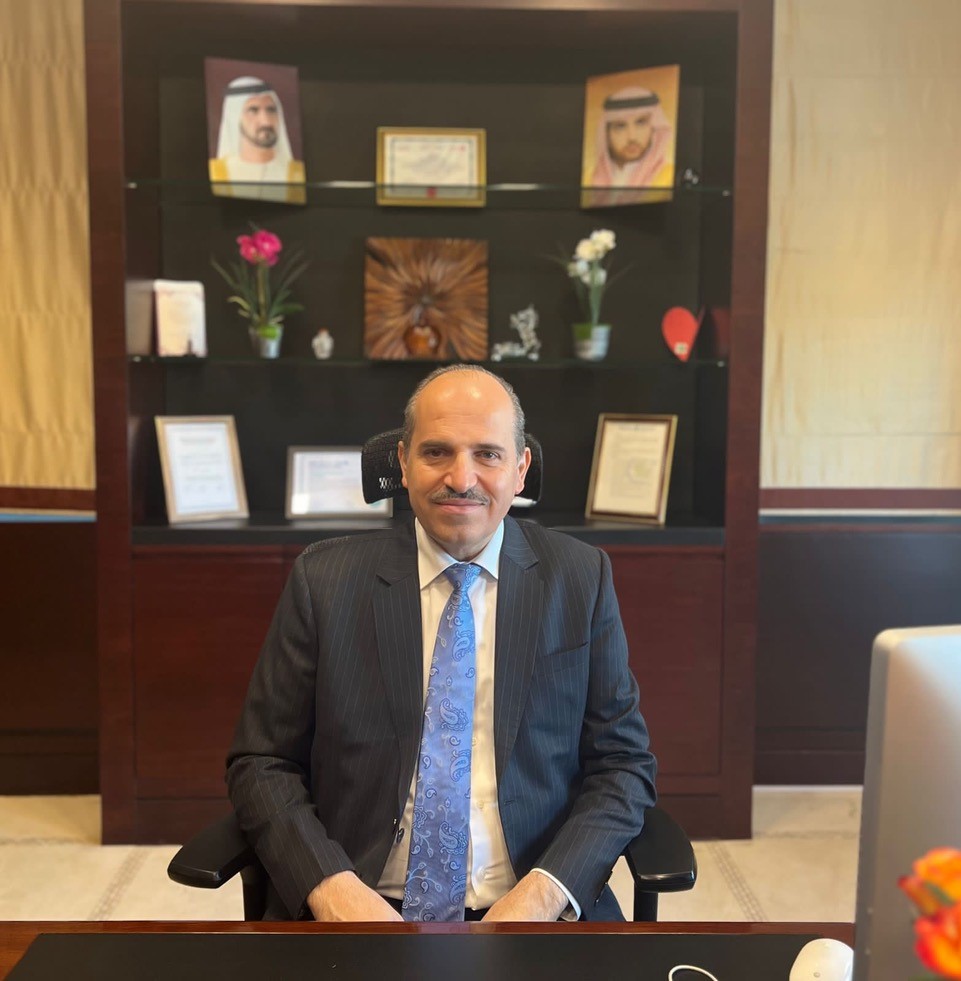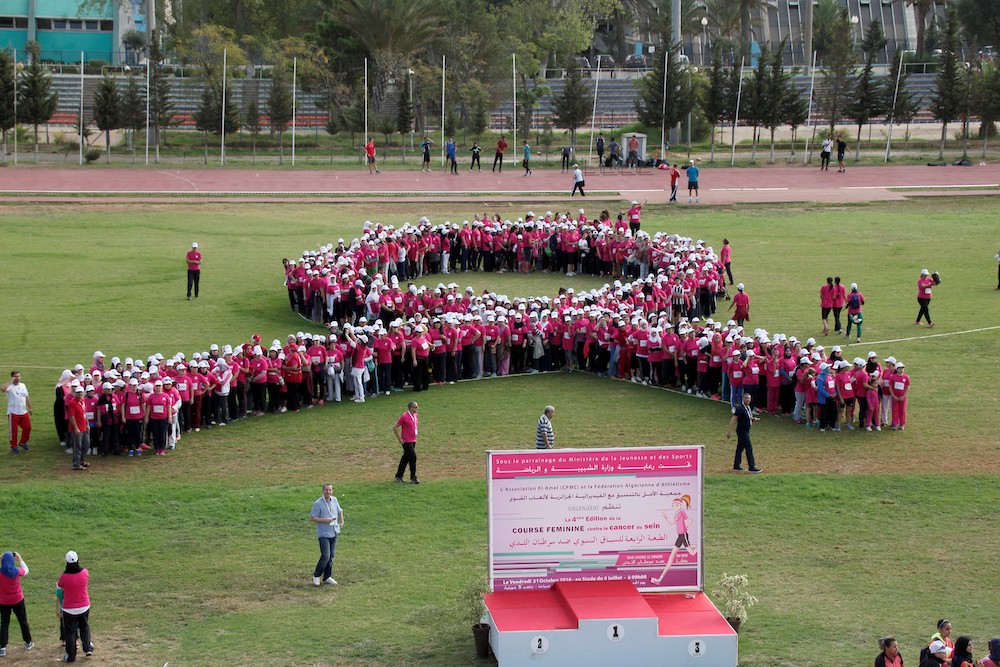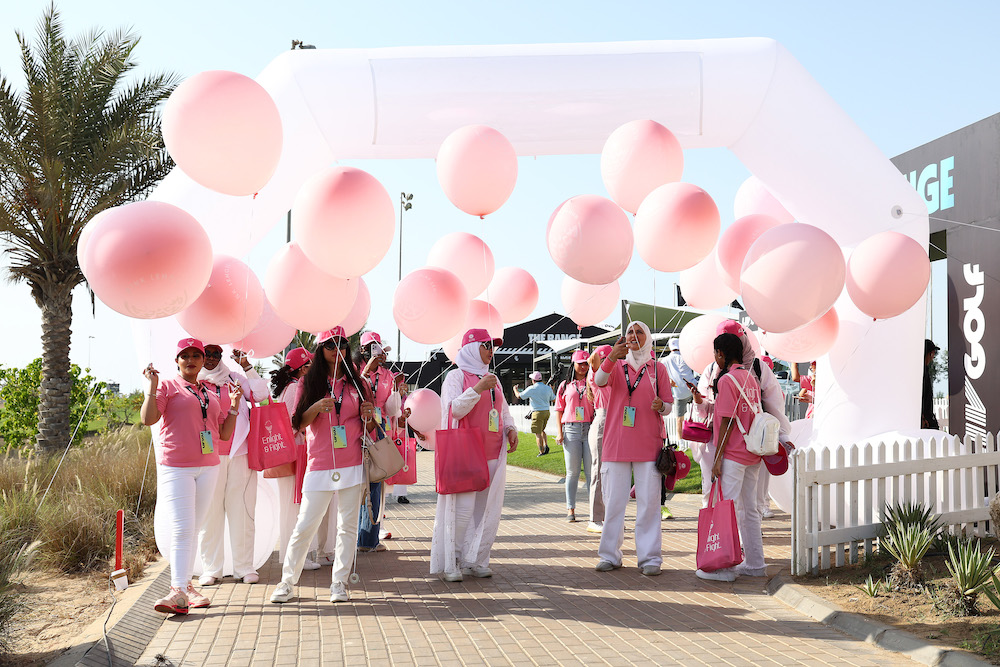DUBAI: The well-known saying “an ounce of prevention is worth a pound of cure” could not be more true than in the case of diagnosis and treatment of many forms of cancer.
Like every year, October is being marked around the world with breast cancer awareness campaigns, which highlight the importance of early detection, self-examination and screening in addition to making better behavioral choices.
In Saudi Arabia, Roshn Group, Saudi Arabia’s leading mixed-asset real estate developer, and Lulu Group are among the many companies partnering with the Zahra Breast Cancer Association for raising awareness about the disease across the Kingdom.
While the phrase “you have cancer” uttered by one’s doctor may be dread-inducing, early intervention has been seen to save many women in the Arab region from further pain and suffering.
Two years ago, 44-year-old schoolteacher and mother of two Hadeel Khwanda, a Syrian living in Dubai, began experiencing shooting pain, itching and other health issues. Despite her doctor saying the problems were stress related and would go away with time, they continued into the summer break.
Still concerned, Khwanda sought a second opinion from another doctor who requested a biopsy. Khwanda was diagnosed with stage two breast cancer, which initially came as a shock.
“There is no history of cancer in my family,” she told Arab News. Though she had to undergo a lumpectomy, four chemotherapy sessions and 35 radiation sessions, Khwanda’s decision to undergo early testing likely saved her life.
INNUMBERS
• 2.3m New breast cancer cases detected worldwide in 2020.
• 685,000 Deaths from breast cancer worldwide in 2020.
• 12.5% Proportion of all new cancer cases per year that are breast cancer.
Breast cancer, according to the World Health Organization, is the most prevalent cancer worldwide, affecting post-pubescent females from all walks of life.
WHO statistics estimate that 2.3 million women were diagnosed with breast cancer in 2020. However, medical specialists say the true figure may be even higher, as fewer women received tests during the COVID-19 pandemic. From 2015 to 2020, a total of 7.8 million women were diagnosed.
“When we were growing up and we heard that someone had cancer, it would be the most shocking news, and it was such a rare thing,” Bina Mathews, an Indian resident of Dubai, told Arab News. “Now, many have it.”
Mathews’ battle with cancer began in October last year. The 52-year-old communication professional and mother of two went for a Pap smear test, which she had done annually since her grandmother passed away from ovarian cancer 17 years ago. The test detected “abnormal cells,” and her gynecologist suggested repeating the test after six months.
During her own personal research, Mathews said she read that “if a woman gets this, it is better to do a mammogram.”
The last mammogram she underwent was uncomfortable and painful as the machines used belonged to an older generation. This time, she opted for ultrasound imaging as well. Her mammogram showed a lump in her left breast, and she was eventually diagnosed with stage one breast cancer.
After a lumpectomy, 16 chemotherapy sessions, and 20 radiation sessions, she finally completed her treatment in August this year.

Female skydivers form a pink ribbon above the Palm Jumeirah Island as part Skydive Dubai’s October Breast Cancer Awareness activity on Sept. 22, 2018 in Dubai. (Skydive Dubai/Getty Images)
Mathews recalled the large number of cancer patients she encountered during treatment. Waiting rooms in oncology departments at hospitals and clinics were crowded.
“The chemo rooms are packed, and the scanning machines are like railway stations. People come out and they (medical staffers) just have time to prepare for the next patient, even in radiation. There are so many people, and so many young ones … this is heartbreaking,” she added.
In the Arab region in particular, researchers now warn that practically all types of cancer, including breast cancer, are being reported at an increasing rate, which will likely continue for the next few years.
“The Gulf States and the Eastern Mediterranean Region countries show a disturbing rise in the number of cancer patients. Long-term projections show that by 2030 there will be a 1.8-fold increase in cancer incidence,” according to a scientific paper written by three medical specialists, including Dr. Mostafa Ahmed Arafa, cancer research chair at the College of Medicine at King Saud University in Riyadh.
There is a correlation between the increasing cancer rates and some factors specific to the Arab region, such as political turmoil, rising poverty, poor health infrastructure and late diagnosis, according to Bashir Abou Reslan, executive director of the Advanced Care Oncology Center in Dubai, a privately owned center established to meet the increasing demand for cancer treatment.
“These factors neither increase nor decrease the number of (cancer) cases, but they do prevent people from knowing if they have cancer” due to lower rates of testing, Abou Reslan told Arab News.

Bashir Abou Reslan, Executive Director of Advanced Care Oncology Center. (Supplied)
ACOC was established in 2017, initially offering PET scan imagery and chemotherapy and expanding later to include radiation therapy. The center has treated nearly 7,000 patients in the past five years, and currently receives between 50 and 100 patients daily for consultation and treatment. Nearly 40 percent of them have breast cancer.
The center is one among many institutions which have pledged to spread awareness of the importance of regular breast cancer screening, and offers free screenings during October and November.
Abou Reslan said he offered free screening packages to some prospective patients. “I knew some of them personally. I asked them later, ‘Why didn’t you come?’ And they replied, ‘We are scared to know,’” he said, adding that recovery rates for cancer detected in early stages are “very high.”
He added: “But when it is detected at later stages, things will become very difficult.”
Moreover, Abou Reslan pointed out, while previous generations of testing machines were less accurate and more painful, today’s instruments are faster and more comfortable, with a 20-minute exam granting women peace of mind for an entire year.
“Myths about breast cancer need to be demystified,” said Dr. Millicent Alache Bello, a breast cancer surgeon at King’s College Hospital London in Dubai.
“People are still scared of biopsies. But breast cancer, if it is picked up early, can be a treatable condition.”

Participants wearing pink shirts form a human ‘pink ribbon’ during a Breast Cancer Marathon in Algiers, Algeria on Oct. 21, 2016. (Anadolu Agency/Getty Images)
Bello said individuals should pay close attention to their lifestyle and maintain healthy habits, such as exercise.
“Awareness shouldn’t be just in the month of October. It should be a regular thing that happens all the time,” she said, adding that governments, the private sector, and other parties should also be involved in spreading awareness of breast cancer.
As the main partner of Zahra Breast Cancer Association’s National Breast Cancer Awareness Campaign, Roshn Group has said it is sponsoring two breast cancer awareness walks, entitled Making Strides Against Breast Cancer, in Riyadh and Jeddah.
“These walks provide a supportive community for breast cancer survivors and metastatic breast cancer thrivers, caregivers and families alike,” the Public Investment Fund-backed giga-project said, adding that it has activated breast cancer awareness and education booths across its offices and sales centers in Riyadh and Jeddah to communicate the importance of early detection.
For its part, Lulu has announced that a portion of the proceeds from sales of reusable shopping bags at the company’s hypermarkets in Saudi Arabia throughout October will result in a donation to the National Breast Cancer Awareness Campaign.
In the UAE, the Pink Caravan initiative, a project of the Friends of Cancer Patients Society launched in 2011 in Sharjah, travels across the country offering free physical exams and X-ray tests.
Patients who have suspicious test results are referred to specialized clinics for further checkups. Should the patient be diagnosed with cancer, the society offers psychological and financial support through its medical partners, including the ACOC.
In a statement sent to Arab News, the Pink Caravan initiative explained that this year’s figures were nearly double that of last year’s, thanks to the caravan “offering free medical tests to all people regardless of their race, nationality, or religion, and the continuous work to cover all parts of the country, including the remote areas, to spread awareness of the importance of early cancer detection.”

Participants walk in honor of breast cancer awareness during day one of the LIV Golf Invitational – Jeddah at Royal Greens Golf & Country Club on Oct. 14, 2022 in King Abdullah Economic City, Saudi Arabia. (LIV Golf via Getty Images)
Rahma Society for Cancer Patients in Abu Dhabi, Sharjah Charity International and the Dubai Charity Society also provide support. To date, 77,271 women and 16,505 men have received these free tests, with 80 of them receiving a cancer diagnosis.
Other private sector entities participating in awareness campaigns and providing financial support to patients include the UAE Marriott Business Council, which supports Al-Jalila Foundation.
Both society and the corporate world can play an effective role in raising awareness about the importance of prevention and routine screening, including girls’ high schools, media outlets and insurance companies, according to Abou Reslan.
Insurance companies tend to look at early screening tests as “none of their business, but actually it is their business, because early cancer detection can save insurance companies a lot of payments for treatment and expensive medications,” he said.
He suggested that insurance companies could, for example, connect insurance policy renewal with annual screenings for the early diagnosis of breast cancer for women over a certain age.
According to statistics from the American Cancer Society, the five-year survival rate for localized breast cancer, or cancer which has not spread outside of the breast, is 99 percent.
“People should come out of the idea that cancer means death … this is a disease that can be firmly controlled if it is detected early,” Abou Reslan said.






















